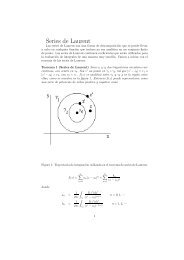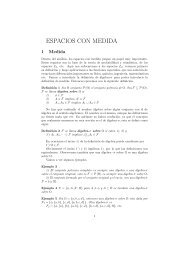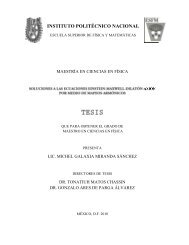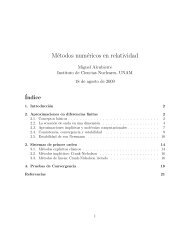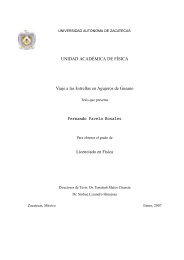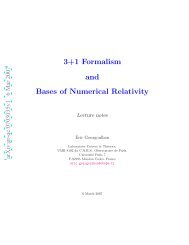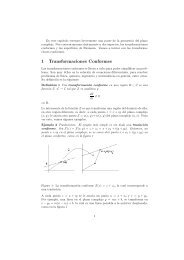- Page 2:
Introduction to Nonextensive Statis
- Page 6:
Constantino TsallisCentro Brasileir
- Page 10:
PrefaceIn 1902, after three decades
- Page 14:
Prefaceixequation inspired by the p
- Page 18:
Prefacexinearby. 4 Nonextensive sta
- Page 22:
Prefacexiiicircular epicycles. So w
- Page 26:
ContentsPart IBasics or How the The
- Page 30:
Contentsxvii5.2 Low-Dimensional Con
- Page 34:
Part IBasics or How the Theory Work
- Page 38:
4 1 Historical Background and Physi
- Page 42:
6 1 Historical Background and Physi
- Page 46:
8 1 Historical Background and Physi
- Page 50:
10 1 Historical Background and Phys
- Page 54:
12 1 Historical Background and Phys
- Page 58:
14 1 Historical Background and Phys
- Page 62:
16 1 Historical Background and Phys
- Page 66:
Chapter 2Learning with Boltzmann-Gi
- Page 70:
2.1 Boltzmann-Gibbs Entropy 212.1.2
- Page 74:
2.1 Boltzmann-Gibbs Entropy 232.1.2
- Page 78:
2.1 Boltzmann-Gibbs Entropy 25where
- Page 82:
2.1 Boltzmann-Gibbs Entropy 27the s
- Page 86:
2.2 Kullback-Leibler Relative Entro
- Page 90:
2.3 Constraints and Entropy Optimiz
- Page 94:
2.4 Boltzmann-Gibbs Statistical Mec
- Page 98:
2.4 Boltzmann-Gibbs Statistical Mec
- Page 102:
Chapter 3Generalizing What We Learn
- Page 106:
3.1 Playing with Differential Equat
- Page 110:
3.2 Nonadditive Entropy S q 41We sh
- Page 114:
3.2 Nonadditive Entropy S q 43This
- Page 118:
3.2 Nonadditive Entropy S q 453.2.2
- Page 122:
3.2 Nonadditive Entropy S q 47we ca
- Page 126:
3.2 Nonadditive Entropy S q 49S BG
- Page 130:
3.2 Nonadditive Entropy S q 51with
- Page 134:
3.2 Nonadditive Entropy S q 53whose
- Page 138:
3.3 Correlations, Occupancy of Phas
- Page 142:
3.3 Correlations, Occupancy of Phas
- Page 146:
3.3 Correlations, Occupancy of Phas
- Page 150:
3.3 Correlations, Occupancy of Phas
- Page 154:
3.3 Correlations, Occupancy of Phas
- Page 158:
3.3 Correlations, Occupancy of Phas
- Page 162:
3.3 Correlations, Occupancy of Phas
- Page 166:
3.3 Correlations, Occupancy of Phas
- Page 170:
3.3 Correlations, Occupancy of Phas
- Page 174:
3.3 Correlations, Occupancy of Phas
- Page 178:
3.3 Correlations, Occupancy of Phas
- Page 182:
3.3 Correlations, Occupancy of Phas
- Page 186:
3.3 Correlations, Occupancy of Phas
- Page 190:
3.3 Correlations, Occupancy of Phas
- Page 194:
3.3 Correlations, Occupancy of Phas
- Page 198:
3.4 q-Generalization of the Kullbac
- Page 202:
3.4 q-Generalization of the Kullbac
- Page 206:
3.5 Constraints and Entropy Optimiz
- Page 210:
3.6 Nonextensive Statistical Mechan
- Page 214:
3.6 Nonextensive Statistical Mechan
- Page 218:
3.6 Nonextensive Statistical Mechan
- Page 222:
3.6 Nonextensive Statistical Mechan
- Page 226:
3.7 About the Escort Distribution a
- Page 230:
3.7 About the Escort Distribution a
- Page 234:
3.8 About Universal Constants in Ph
- Page 238:
3.9 Various Other Entropic Forms 10
- Page 242:
Part IIFoundations or Why the Theor
- Page 246:
110 4 Stochastic Dynamical Foundati
- Page 250:
112 4 Stochastic Dynamical Foundati
- Page 254:
114 4 Stochastic Dynamical Foundati
- Page 258:
116 4 Stochastic Dynamical Foundati
- Page 262:
118 4 Stochastic Dynamical Foundati
- Page 266:
120 4 Stochastic Dynamical Foundati
- Page 270:
122 4 Stochastic Dynamical Foundati
- Page 274:
124 4 Stochastic Dynamical Foundati
- Page 278:
126 4 Stochastic Dynamical Foundati
- Page 282:
128 4 Stochastic Dynamical Foundati
- Page 286:
130 4 Stochastic Dynamical Foundati
- Page 290:
132 4 Stochastic Dynamical Foundati
- Page 294:
134 4 Stochastic Dynamical Foundati
- Page 298:
136 4 Stochastic Dynamical Foundati
- Page 302:
138 4 Stochastic Dynamical Foundati
- Page 306:
140 4 Stochastic Dynamical Foundati
- Page 310:
142 4 Stochastic Dynamical Foundati
- Page 314:
144 4 Stochastic Dynamical Foundati
- Page 318:
146 4 Stochastic Dynamical Foundati
- Page 322:
148 4 Stochastic Dynamical Foundati
- Page 326:
150 4 Stochastic Dynamical Foundati
- Page 330:
152 5 Deterministic Dynamical Found
- Page 334:
154 5 Deterministic Dynamical Found
- Page 338:
156 5 Deterministic Dynamical Found
- Page 342:
158 5 Deterministic Dynamical Found
- Page 346:
160 5 Deterministic Dynamical Found
- Page 350:
162 5 Deterministic Dynamical Found
- Page 354:
164 5 Deterministic Dynamical Found
- Page 358:
166 5 Deterministic Dynamical Found
- Page 362:
10 -5 1 10 100 100010 -5 1 10 100 1
- Page 366:
170 5 Deterministic Dynamical Found
- Page 370:
172 5 Deterministic Dynamical Found
- Page 374:
174 5 Deterministic Dynamical Found
- Page 378:
176 5 Deterministic Dynamical Found
- Page 382:
178 5 Deterministic Dynamical Found
- Page 386:
180 5 Deterministic Dynamical Found
- Page 390:
182 5 Deterministic Dynamical Found
- Page 394:
184 5 Deterministic Dynamical Found
- Page 398:
186 5 Deterministic Dynamical Found
- Page 402:
188 5 Deterministic Dynamical Found
- Page 406:
190 5 Deterministic Dynamical Found
- Page 410:
192 5 Deterministic Dynamical Found
- Page 414:
194 5 Deterministic Dynamical Found
- Page 418: 196 5 Deterministic Dynamical Found
- Page 422: 198 5 Deterministic Dynamical Found
- Page 426: 200 5 Deterministic Dynamical Found
- Page 430: 202 5 Deterministic Dynamical Found
- Page 434: 204 5 Deterministic Dynamical Found
- Page 438: 206 5 Deterministic Dynamical Found
- Page 442: Chapter 6Generalizing Nonextensive
- Page 446: 6.2 Further Generalizing 211dydx =
- Page 450: 6.2 Further Generalizing 213∫ W{
- Page 454: 6.2 Further Generalizing 215Then, f
- Page 458: 6.2 Further Generalizing 217If f (
- Page 462: Part IIIApplications or What for th
- Page 466: 222 7 Thermodynamical and Nonthermo
- Page 472: 7.1 Physics 225hypergeometric funct
- Page 476: 7.1 Physics 227Fig. 7.6 The dashed
- Page 480: 7.1 Physics 229Fig. 7.7 Example sha
- Page 484: 7.1 Physics 231Fig. 7.11 Experiment
- Page 488: 7.1 Physics 2337.1.4 FingeringWhen
- Page 492: 7.1 Physics 235Fig. 7.16 The vertic
- Page 496: 7.1 Physics 237Fig. 7.19 Measured (
- Page 500: 7.1 Physics 239Fig. 7.23 Time evolu
- Page 504: 7.1 Physics 2417.1.8 Astrophysics7.
- Page 508: 7.1 Physics 243Fig. 7.28 Top: Fits
- Page 512: 7.1 Physics 245Fig. 7.30 Log-Log pl
- Page 516: 7.1 Physics 247Fig. 7.32 Dependence
- Page 520:
7.1 Physics 249Fig. 7.36 Data colla
- Page 524:
7.1 Physics 251Fig. 7.39 Cumulative
- Page 528:
7.1 Physics 253a0-1--2-3-4-5- - - -
- Page 532:
7.1 Physics 2551.25fit in Fig.2Eq.(
- Page 536:
7.1 Physics 2574.0q relc3.53.02.52.
- Page 540:
7.2 Chemistry 259Fig. 7.49 (a) Dime
- Page 544:
7.2 Chemistry 261Fig. 7.52 d = 2(a)
- Page 548:
7.2 Chemistry 263Fig. 7.55 Snapshot
- Page 552:
7.2 Chemistry 265Fig. 7.58 Log-log
- Page 556:
7.3 Economics 267Fig. 7.60 Ground-s
- Page 560:
7.4 Computer Sciences 269Fig. 7.64
- Page 564:
7.4 Computer Sciences 271Fig. 7.67
- Page 568:
7.4 Computer Sciences 273Fig. 7.71
- Page 572:
7.4 Computer Sciences 275Fig. 7.74
- Page 576:
7.4 Computer Sciences 277Fig. 7.77
- Page 580:
7.4 Computer Sciences 279Fig. 7.80
- Page 584:
7.5 Biosciences 281Fig. 7.82 Image
- Page 588:
7.8 Scale-Free Networks 283Fig. 7.8
- Page 592:
7.8 Scale-Free Networks 285a1b1cumu
- Page 596:
7.8 Scale-Free Networks 287Fig. 7.9
- Page 600:
7.8 Scale-Free Networks 289Fig. 7.9
- Page 604:
7.8 Scale-Free Networks 291Fig. 7.9
- Page 608:
7.8 Scale-Free Networks 293Fig. 7.9
- Page 612:
7.10 Other Sciences 295Fig. 7.102 S
- Page 616:
7.10 Other Sciences 297Fig. 7.105 F
- Page 620:
7.10 Other Sciences 299Fig. 7.109 Z
- Page 624:
7.10 Other Sciences 301Fig. 7.112 C
- Page 628:
Chapter 8Final Comments and Perspec
- Page 632:
8.1 Falsifiable Predictions and Con
- Page 636:
8.2 Frequently Asked Questions 309i
- Page 640:
8.2 Frequently Asked Questions 311B
- Page 644:
8.2 Frequently Asked Questions 313(
- Page 648:
8.2 Frequently Asked Questions 315o
- Page 652:
8.2 Frequently Asked Questions 317p
- Page 656:
8.2 Frequently Asked Questions 319n
- Page 660:
8.2 Frequently Asked Questions 321L
- Page 664:
8.2 Frequently Asked Questions 323(
- Page 668:
8.2 Frequently Asked Questions 3254
- Page 672:
8.3 Open Questions 327This is a fre
- Page 676:
330 Appendix A Useful Mathematical
- Page 680:
332 Appendix A Useful Mathematical
- Page 684:
334 Appendix A Useful Mathematical
- Page 688:
336 Appendix B Escort Distributions
- Page 692:
338 Appendix B Escort Distributions
- Page 696:
340 Appendix B Escort Distributions
- Page 700:
Bibliography1. J.W. Gibbs, Elementa
- Page 704:
Bibliography 34541. A. Rapisarda an
- Page 708:
Bibliography 34784. A.N. Kolmogorov
- Page 712:
Bibliography 349123. T. Schneider,
- Page 716:
Bibliography 351178. A. Campa, A. G
- Page 720:
Bibliography 353230. S. Abe and A.K
- Page 724:
Bibliography 355279. K. Briggs and
- Page 728:
Bibliography 357329. T. Kodama, H.-
- Page 732:
Bibliography 359Italy), eds. C. Bec
- Page 736:
Bibliography 361431. M.J.A. Bolzan,
- Page 740:
Bibliography 363479. T. Cattaert, M
- Page 744:
Bibliography 365528. P.H. Chavanis,
- Page 748:
Bibliography 367579. G.A. Tsekouras
- Page 752:
Bibliography 369631. J. Schulte, No
- Page 756:
Bibliography 371678. D. Fuks, S. Do
- Page 760:
Bibliography 373723. L.J. Yang, M.P
- Page 764:
Bibliography 375767. S. Sun, L. Zha
- Page 768:
Bibliography 377813. S. Abe, Tsalli
- Page 772:
Bibliography 379862. S. Boccaletti,
- Page 776:
382 IndexKekule, ixKepler, xiiKrylo



